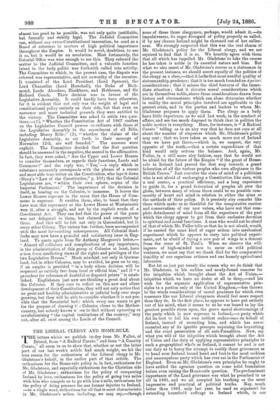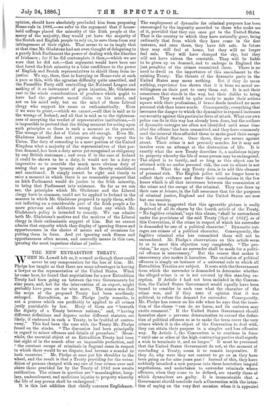THE LIBERAL CLERGY AND HOME-RULE.
THE letters which we publish to-day from Mr. Fuller, of Bristol, from "A Radical Curate," and from "A Country Curate," all seem to us to show that, whether or not the latter part of our last week's article had much weight, we hit the true reason for the enthusiasm of the Liberal clergy in Mr. Gladstone's behalf, in the earlier part of that article. The enthusiasm for the Home-rule policy is, in fact, enthusiasm for Mr. Gladstone, and especially enthusiasm for the Christian side of Mr. Gladstone ; enthusiasm for the policy of conquering Ireland by love, enthusiasm for the policy of going two miles with him who compels us to go with him a mile, enthusiasm for the policy of doing penance for our former injuries to. Ireland, —in a single word, enthusiasm for all that is most characteristic in Mr. Gladstone's action, including, we may say,—though none of these three clergymen, perhaps, would admit it,—its impulsiveness, its eager disregard of policy properly so called, if by any chance Ireland might be charmed out of her sullen- ness. We strongly suspected that this was the real charm of Mr. Gladstone's policy for the Liberal clergy, and we are rejoiced to find that it is so. We heartily agree with them that all which has impelled Mr. Gladstone to take the course he has taken is noble in its essential nature and bias. But what we also assert of Mr. Gladstone's course as a statesman in the present instance, we should assert equally of the politics of the clergy as a class,—that it lacks that most needful quality of statesmanship, prudence; that it is too much founded on cipriori considerations ; that it misses the chief features of the imme- diate situation ; that it elevates moral considerations which are in themselves noble, above those considerations drawn from history and circumstance which can alone determine whether in reality the moral principles involved are applicable to the present crisis, and to the parties and leaders to whom Mr. Gladstone proposes to apply them. The clergy as a body have little experience, as we said last week, in the conduct of affairs, and are too much disposed to think that in politics the noble motive is everything. Here, for instance, is " A Radical Curate " telling us in an airy way that he does not care at all about the number of sixpences which Mr. Gladstone's policy may cost ; that we have taken so much more out of Ireland than we have put there,—which is, we suspect, the very opposite of the truth,—that a certain expenditure of that kind would only redress the balance. And, again, Mr. Fuller, in a still more airy fashion, says that he would not be afraid for the future of the Empire "if the grant of Home- rule to Ireland had proved the first step towards a grand federation of all the various peoples who own allegiance to the British Crown." Just conceive the state of mind of a politician who is not afraid of exchanging a Constitution like ours, with a real centre, a practical efficiency, and a long experience to guide it, for a grand federation of peoples all over the globe, between many of whom there could be no possible com- munity of heart and mind in relation to either the aims or the methods of their policy. It is precisely airy remarks like these which make us so thankful for the comparative caution and conservatism of our new voters, who have not that com- plete detachment of mind from all the experience of the past which the clergy appear to get from their exclusive devotion to spiritual and moral functions. A man who would not be afraid of that of which Mr. Fuller tells us that he is not afraid, would, if he carried the same kind of eager ardour into mechanical experiment which he appears to carry into political experi- ment, not be afraid of trying a new pair of wings in a descent from the cross of St. Paul's. When we observe the will- ingness of high-minded men to enter on wild political ventures, we must say that we thank God for the comparative timidity of our sagacious artisans and our homely agricultural labourers.
But let us just put tersely the reason why we do think that Mr. Gladstone, in his sudden and newly-found remorse for the iniquities which brought about the Act of Union,— iniquities which we have no desire at all to deny,—and his wish for the separate application of representative prin- ciples to a portion only of the United Kingdom,—has thrown to the winds considerations of moral prudence for which even reasoners like our Liberal clergymen should feel more respect than they do. In the first place, he appears to have put entirely out of his mind, what it seems to us he was bound to lay the greatest possible stress upon, the grave moral shortcomings of the party which is now supreme in Ireland,—a party which did its best to foil his own noblest endeavours on behalf of Ireland, instead of seconding him, and which has never recanted any of its ignoble precepts enjoining the boycotting and the cruel persecution of all anti-Parnellites. Now, say what you will of the iniquities which brought about the Act of Union and the duty of applying representative principles to such a geographical whole as Ireland, it cannot be and is not our duty so to hurry the attempt to rectify these grievances as to hand over Ireland bound hand and foot to the most reckless and unscrupulous party which has ever sat in the Parliament of England. Even on Mr. Gladstone's own principles he ought to have settled the agrarian question on some solid foundation
before even raising the Home-rule question. The predominant importance of the Land grievance was what he preached to us all in 1881, and we all accepted his teaching as the most
impressive and practical of political truths. Nay, much latter than 1881, only last year, he used an argament for extending household suffrage to Ireland which, in our
opinion, should have absolutely precluded him from proposing Home-rule in 1886,—we refer to the argument that if house- hold suffrage placed the minority of the Irish people at the mercy of the majority, they would yet have the majority of the Scotch and English people to rely on, to save them from any infringement of their rights. That seems to us to imply that at that time Mr. Gladstone had not even thought of delegating to a purely Irish Parliament the power of dealing with the liberties of Irishmen ; for if he did contemplate it then,—which we are sure that he did not,—that argument would have been one that lured the Irish minority to a false confidence in the power of English and Scotch representatives to shield them from in- justice. We say, then, that in hurrying on Home-rule at such a pace as this, with the agrarian difficulty quite unsettled, and the Parnellite Party still controlling the National League and making of it an instrument of gross injustice, Mr. Gladstone cast to the winds considerations of prudence which qught to have had the greatest moral claim on his mind, and not on his mind only, but on the mind of those Liberal clergy who support his cause so enthusiastically. Even if we were to grant,—which we cannot,—all that is said as to the wrongs of Ireland, and all that is said as to the righteous- ness of accepting the verdict of representative institutions,—it is impossible to pretend that the fitting moment for acting upon such principles as these is such a moment as the present. The wrongs of the Act of Union are old enough. Even Mr. Gladstone himself does not propose simply to repeal the Union. The duty of conceding to a mere portion of the United Kingdom what a majority of the representatives of that por- tion demand, has been a duty never yet recognised as obligatory by any British statesman ; and even if in the case of Ireland it could be shown to be a duty, it would not be a duty so imperative as to override the much more obvious duty of seeing that no gross tyranny should be thereby established and sanctioned. It simply cannot be right and timely to seize a moment in which there is no reasonable prospect that an Irish Parliament would do justice to the Irish minority, to bring that Parliament into existence. So far as we can see, the principles which Mr. Gladstone and the Liberal clergy have in common, could not be applied to Ireland in the manner in which Mr. Gladstone proposed to apply them, with- out inflicting on a considerable part of the Irish people a far more grievous and deliberate wrong than any which Mr. Gladstone's policy is intended to remedy. We can admire both Mr. Gladstone's motives and the motives of the Liberal clergy in their enthusiastic support of him. But we cannot admire that capacity which they display of ignoring fitness and opportuneness in the choice of means and of occasions for putting them in force. And yet ignoring such fitness and opportuneness often means, and assuredly means in this case, ignoring the most imperious claims of justice.



































 Previous page
Previous page